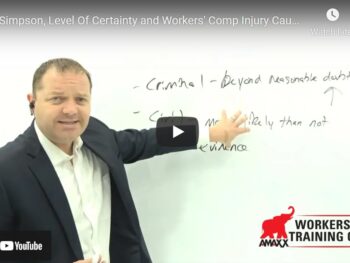The recent Alabama Supreme Court case that held an idiopathic injury occurring in the workplace is not a compensable injury is another example of how the various states differ in what is and what is not workers compensation. A few states cover most idiopathic injuries in workers compensation, most states cover idiopathic injuries that meet narrow restrictions and some states deny workers compensation benefits for any idiopathic injury.
An idiopathic injury is an injury arising from an unexplained origin or cause. For the purposes of workers compensation, some states have broadened the definition of idiopathic injury to include an injury brought on by a purely personal condition. If you ask why all the fuss over the origin or cause of the injury, the answer is because of the wording of most workers compensation statutes. Most states have wording in the work comp laws qualifying when an injury is to be covered by work comp. The laws will read the injury must “arise out of and in the course of employment” Idiopathic injuries do not meet this definition as they do not “arise out of” the employment.
Click Link to Access Free PDF Download
“How To Avoid, Manage, And Win Workers’ Comp Claim Litigation”
Workers compensation statutes borrow from tort law the concept that you take an employee as you find him/her with all their bodily flaws. Simply put, if your employee already has a weak back and hurts his back while working, you are stuck with the work comp claim. With the employee who is prone to get hurt because of a bodily flaw like the weak back, the injury arises out of and in the course of the employment. This differs from the employee who has an idiopathic episode where the weak back starts hurting while at work, but the back pain has no relationship to the work.
Another example, if the employee has a heart attack (a purely personal condition) while setting at his desk working (in a non-stressful environment), it is not a work comp injury. If the heart attack employee falls out of his desk chair and hits his head on the floor, the injury to the head is still not a work comp claim in most states. However, if the employment premises increases the risk of injury or aggravates the injury, the injury will become compensable. For example, the employee has a heart attack while climbing a ladder to the top of a tower, and falls injuring other body parts. The other body parts injured in the fall will be covered in most states as the employment premises increased the risk of injury.
The first idiopathic injury case in Georgia is often used as an example of the narrow interpretation of idiopathic injuries in most states. In 1947, a Mr. Richardson worked in a department store selling men’s apparel. The alteration and tailoring department of the store was on a different floor of the store, resulting in Mr. Richardson making numerous trips up and down the stairs each day. Mr. Richardson was an epileptic and had suffered epileptic attacks while working on previous occasions. There was no evidence that the epileptic condition was in anyway related to Mr. Richardson’s employment. However, it was known that exertion brought on the epileptic attacks, but their was no evidence of exertion prior to the epileptic attack from the incident from which his work comp injury arose. In prior epileptic episodes, Mr. Richardson had fallen on the floor sometimes with minor injuries, sometimes with no injury. When Mr. Richardson fell during the epileptic attack in question, he struck the side of his head on the sharp corner of a table resulting in a skull fracture and a brain injury The Court ruled that the sharp corner of the table was a hazard of his workplace environment and the resulting head injuries were compensable.
Most states that allow idiopathic injuries have follow Georgia in this regards by allowing injuries that result from idiopathic conditions (but not the idiopathic condition) to be considered workers compensation when there is a hazard connected to the employment. When employees faint, have a heart attack or stroke, or fall for no apparent reason and land on the floor without striking any object, the resulting injury from landing on the floor is not a work comp injury (in most states). However, if the employee strikes an object while falling, the injury will be covered as a work comp claim. In addition, if the employee is at an increase risk of injury when they fall, for instance from an unprotected height, or off a ladder, or down a flight of stairs, the resulting injuries are normally covered by work comp.
Another example of where an idiopathic injury can be covered is the long distance truck driver. In a Florida case, the employee was part of a truck driving team where each driver would drive the maximum of eleven hours with minimum breaks before the other truck driver took over. open-ended. The 60-year-old truck driver had a pulmonary embolism after he had been driving for about ten hours. (A pulmonary embolism is a blockage of the main artery of the lung or one branches of the artery by a blood clot that traveled through the bloodstream from the deep veins in the legs). The initial response from the work comp adjuster that this was not work related but resulting from the employee’s personal medical condition. However, the treating medical provider stated the pulmonary embolism was a direct result of the extended time the employee was remained seated while driving the truck. This was a purely personal condition that was aggravated by the requirements of the job, and hence a compensable work comp claim.
Idiopathic injuries and idiopathic conditions will continue to be an area of work comp law that will often be litigated, as they do not fall clearly within the definition of workers compensation. If you have an occurrence of where a person has a medical condition that results in an injury (as opposed to the activities of work resulting in an injury), your best course of action is to immediately discuss the matter with your workers compensation claims manager and/or your work comp defense attorney. The claims manager or defense attorney can provide you direction on how to proceed. The primary advice will be to clarify all the events surrounding the idiopathic injury so a correct determination of compensability can be made.
Author Rebecca Shafer, JD, President of Amaxx Risks Solutions, Inc. is a national expert in the field of workers compensation. She is a writer, speaker, and website publisher. Her expertise is working with employers to reduce workers compensation costs, and her clients include airlines, healthcare, printing/publishing, pharmaceuticals, retail, hospitality, and manufacturing. See www.LowerWC.com for more information. Contact:RShafer@ReduceYourWorkersComp.com or 860-553-6604.
WORK COMP CALCULATOR: http://www.LowerWC.com/calculator.php
MODIFIED DUTY CALCULATOR: http://www.LowerWC.com/transitional-duty-cost-calculator.php
WC GROUP: http://www.linkedin.com/groups?homeNewMember=&gid=1922050/
SUBSCRIBE: Workers Comp Resource Center Newsletter
Do not use this information without independent verification. All state laws vary. You should consult with your insurance broker or agent about workers comp issues.
©2011 Amaxx Risk Solutions, Inc. All rights reserved under International Copyright Law. If you would like permission to reprint this material, contact Info@ReduceYourWorkersComp.com.






















